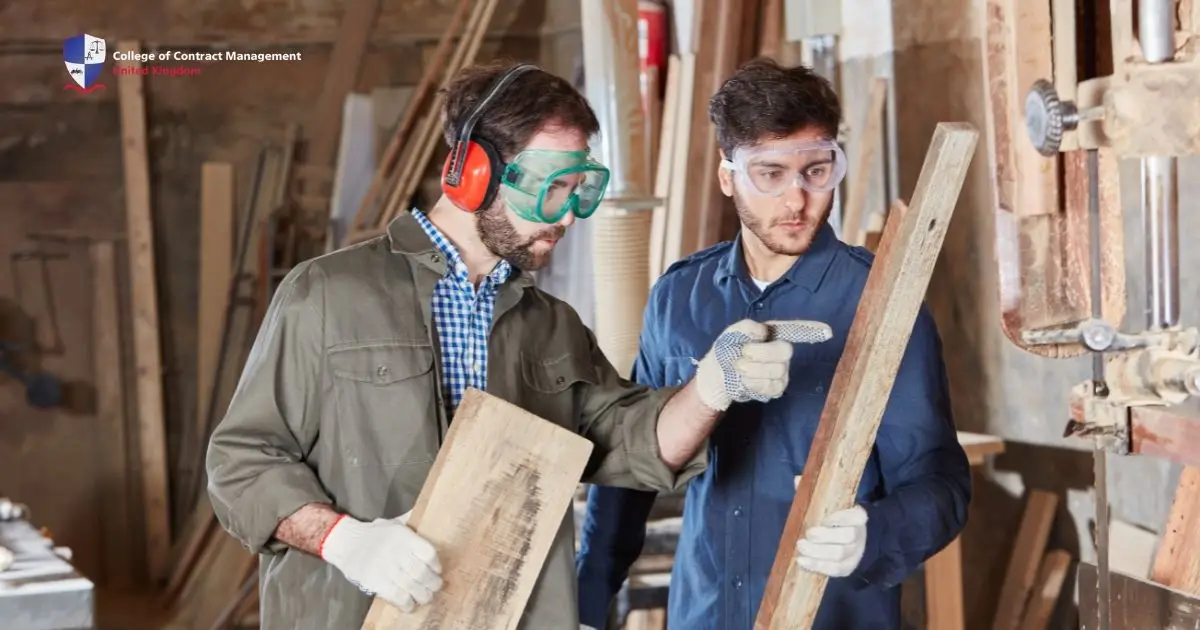The construction industry is changing fast, leading apprenticeships is a great way to learn by doing a real job. These programmes mix job training with lessons in the classroom. People can learn useful skills while earning money. As time goes by, there is a high demand for skilled workers. In other words, construction apprenticeships help people get qualifications and build a strong career.
This article looks at the key skills needed to succeed in construction apprenticeships. It covers both hard skills and soft skills. We'll also explore the education and physical demands for getting the job. Understanding these areas is important for anyone starting a career in construction. By reading this, people will get tips on how to prepare and do well in an apprenticeship. Let's get into the writing!
What are construction apprenticeships?
Construction apprenticeships are training programmes that mix paid jobs with learning in the classroom. Usually, apprentices work for 30 to 40 hours a week. They learn on the job from experienced workers. At the same time, they attend training classes away from the work site. This way, trainees get both practical skills and important knowledge for their trade. This training usually lasts 18 to 24 months. At the end, apprentice workers earn a nationally recognised qualification.
There aren't enough workers in the UK construction industry. In 2023/24, around 33,000 people began their apprenticeships in construction. However, to fill 50,300 new jobs every year, the trade needs three times that many people. The main reasons for this gap are workers getting older, less government funding, Brexit, and the COVID-19 pandemic. To solve this problem, the government set up 32 Homebuilding Skills Hubs. This programme aims to add 5,000 more apprenticeship spots each year. Although this is good, experts say this system needs a review to ensure it works well.
Types of construction apprenticeships
Construction apprenticeships offer many career options. These include hands-on trades and technical or management roles. As shown above, apprenticeships mix work training with studying. This training lets people earn money while learning new skills. In fact, apprenticeships are available from Level 2 (similar to GCSEs) to Level 7 (similar to a master’s degree). By working on those levels, apprenticeships help workers build their careers gradually.
This section discusses the types of apprenticeships in the construction field. These include trades like bricklaying, technical jobs, and management roles. By learning these, people can pick the right path for their interests and goals. Therefore, here are the details:
Trade-specific apprenticeships
Construction apprenticeships in trade-specific combine a practical job with studying. They focus on building skills for a particular trade. This programme is available from Level 2 to Level 7. Apprentices will get experience and knowledge at the same time to be excellent in their field. As a result, it helps them meet industry needs. Here are the examples:
- Bricklaying: Bricklaying construction apprenticeships teach how to build walls and other structures using bricks and mortar. By doing so, they develop skills in laying bricks, reading plans to execution, and checking structural safety.
- Carpentry: Carpentry training focuses on using wood to build parts of buildings. In this case, learners practise measuring, cutting, and fitting wood for frames and fittings.
- Plumbing: Plumbing construction apprenticeships teach how to install and repair water, heating, and drainage systems. Apprentices get hands-on training with pipes and system checks. They also learn about new green systems like solar heating.
- Electrical installation: Electrical installation training prepares students to work with wiring and electrical systems. They learn to install, fix, and check systems in homes and businesses. Aside from that, safety, system design, and rules are also part of the training.
Professional roles
Professional apprenticeships offer a clear path for people who want to enter skilled roles. As shown above, these roles need both classroom learning and hands-on experience. However, this training is available from Level 4 to Level 7. Participants learn by doing the job while also studying topics related to their field. In the end, they understand complex construction tasks and are ready to face real-world challenges in the industry. Here are the examples:
- Construction Management: These construction apprenticeships teach how to lead and plan projects. By the time it helps people get ready to run, it builds work from start to finish.
- Quantity Surveying: This programme trains apprentices in cost estimating and managing money. In other words, they learn to watch budgets, contracts, and expenses.
- Architecture: This construction apprenticeships mix design with hands-on training. By doing so, people can get the skills for architecture jobs.
Emerging fields
New construction apprenticeships are changing the industry. These programmes teach people how to use modern tools and smart technology. Besides, they learn about clean energy and digital building. These apprenticeships help workers get ready for future jobs. While this may be true, this programme is available from Level 4 to Level 7. By using new ideas and focusing on the environment, the training helps workers face new challenges. Here are the examples:
- Building Information Modelling (BIM) Specialist: In this role, apprentices create and manage digital models of construction projects. They use BIM software like Revit or AutoCAD. In time, it helps them plan and coordinate better.
- Drone Pilot & Aerial Surveyor: Apprentices learn to fly drones for site inspections. They also track progress and collect geospatial data. This helps make construction sites safer and work more efficiently.
- Sustainability Consultant: These construction apprenticeships learn how to build in an eco-friendly way. They study designs that save energy. They also learn how to use materials that are good for the environment.
- Green Building Specialist: This training helps apprentices earn certifications like Building Research Establishment Environmental Assessment Method (BREEAM). It also teaches them how to use green building methods that reduce harm to the environment.
Skills for an apprenticeship in construction
To do well in construction apprenticeships, you need both technical and soft skills. The construction industry moves fast and can be complex. However, success comes from more than just using tools or reading plans. Employers want apprentices who stay flexible, work well with others, and take the lead when needed. Here are the key skills people should build to succeed:
- Technical skills: Construction apprentices need skills in math, reading blueprints, and using tools safely. Besides, they must follow safety rules and learn new tech like BIM and drones. These skills help them do quality work and adapt to changes.
- Soft skills: Soft skills like communication, teamwork, and problem-solving are key for working well in construction. At the same time, they also help with safety and career growth during training.
- Physical and personal attributes: Physical strength and stamina are very important in construction apprenticeships. These help people work safely and correctly. Aside from that, they also let them handle tough tasks.
Educational and entry requirements
Starting construction apprenticeships in the UK is a smart way to begin a career. People get hands-on experience and classroom learning. This means they can earn money while gaining important skills. The UK construction sector has a big skills shortage. For this reason, apprenticeships help train workers to meet the country’s building needs. Here are the requirements to apply:
- General requirement: To apply for construction apprenticeships in the UK, apprentices must be 16 or older. Besides, they must not be in full-time education. These criteria apply regardless of the background.
- Educational qualification: To apply for the entry-level apprenticeships, trainees need to pass GCSEs in English and Maths. Meanwhile, they need the A-level in relevant subjects or complete previous training to apply for the higher ones.
Tips to apply for apprenticeships in construction
To start construction apprenticeships, you need to do some research first. You can use websites to find available apprenticeships. Some sites show many options and give useful advice. You should also look at company websites, as many employers list jobs there. Apply to more than one apprenticeship to have a better chance of getting a place.
Aside from research, writing a strong application is very important. Make sure to change your CV and cover letter for each apprenticeship. In this case, show your skills, experience, and qualifications that match the job. You may also include any work you have done, like part-time jobs or volunteering. Besides, show your excitement for working in construction. After that, check your application carefully for mistakes. If you can, ask someone else to read it before you send it.
After applying, preparing for the interview is also important. You can do this by researching the company well. Ensure to learn about their projects, values, and recent news. Most importantly, be ready to explain how your skills and experience fit the construction apprenticeships. Think about how to show your passion for construction and your desire to learn. Remember, the interview is your chance to prove you are good for the role.
Conclusion
In conclusion, construction apprenticeships in the UK offer a good way to start a career. These programmes help people gain useful skills and certificates. They also help fix the shortage of skilled workers. The industry is changing with new technology and green building methods. Whether you are new or want to learn more, an apprenticeship in construction gives you a strong base for success.
If you want to build a strong career in construction, the College of Contract Management can help. They offer trusted online courses that fit around your schedule. Besides, the College gives you the support you need to succeed. Ready to move forward? Visit our website to explore your options and take the first step toward a better future!





